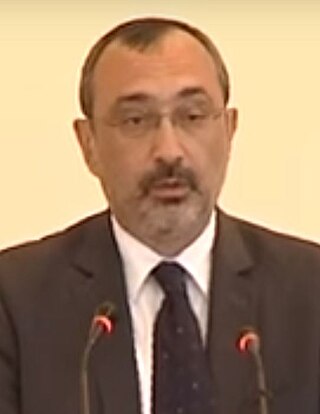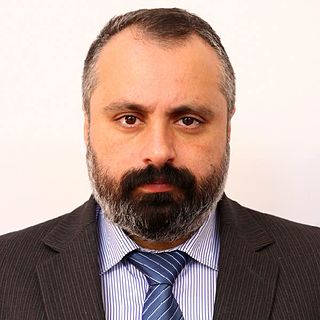Related Research Articles

Since its independence, Armenia has maintained a policy of trying to have positive and friendly relations with Iran, Russia, and the West, including the United States and the European Union. It has full membership status in a number of international organizations, such as the Council of Europe and the Eurasian Economic Union, and observer status, etc. in some others. However, the dispute over the Armenian genocide of 1915 and the ongoing Nagorno-Karabakh conflict have created tense relations with two of its immediate neighbors, Azerbaijan and Turkey.

Foreign relations of Latvia are the primary responsibility of the Ministry of Foreign Affairs. Today's Republic of Latvia regards itself as a continuation of the 1918–1940 republic. After the declaration on the restoration of its full independence on August 21, 1991, Latvia became a member of the United Nations on September 17, 1991, and is a signatory to a number of UN organizations and other international agreements. Latvia welcomes further cooperation and integration with NATO, European Union, OECD and other Western organizations. It also seeks more active participation in UN peacekeeping efforts worldwide.

Foreign relations of Tajikistan are based on a desire to secure foreign investment and promote regional security while ensuring Tajikistan's independence. Sirodjidin Aslov is the current Foreign’s Minister of Tajikistan.

Artsakh, officially the Republic of Artsakh or the Republic of Nagorno-Karabakh, was a breakaway state in the South Caucasus whose territory was internationally recognised as part of Azerbaijan. Between 1991 and 2023, Artsakh controlled parts of the former Nagorno-Karabakh Autonomous Oblast of the Azerbaijani Soviet Socialist Republic, including its capital Stepanakert. It had been an enclave within Azerbaijan from the 2020 Nagorno-Karabakh war until the 2023 Azerbaijani offensive, when the Azerbaijani military took control over the remaining territory controlled by Artsakh. Its only overland access route to Armenia after the 2020 war was via the five kilometres (3.1 mi)–wide Lachin corridor, which was placed under the supervision of Russian peacekeeping forces.

The president of the Republic of Artsakh is the head of state and head of government of the government-in-exile of the once de facto Republic of Artsakh.

The Republic of Artsakh was a republic with limited recognition in the South Caucasus region. The Republic of Artsakh controlled most of the territory of the former Nagorno-Karabakh Autonomous Oblast. It was recognized only by three other non-UN member states, Abkhazia, South Ossetia and Transnistria. The rest of the international community recognized Artsakh as part of Azerbaijan. In November 2012, a member of Uruguay's foreign relations committee stated that his country could recognize Nagorno-Karabakh's independence. In 2012, Armenia and Tuvalu established diplomatic relations, which led to speculation of possible recognition of Artsakh by Tuvalu. In October 2012, the Australian state of New South Wales recognized Nagorno-Karabakh. In September 2014, the Basque Parliament in Spain adopted a motion supporting Artsakh's right to self-determination and in November 2014, the Parliament of Navarre, also in Spain, issued a statement supporting Artsakh's inclusion in taking part in settlement negotiations.

The Transnistrian republic is recognized by two states with limited recognition, and is a member of one international organization, the Community for Democracy and Human Rights.

The Ministry of Foreign Affairs of Armenia (MFA) is a state body of executive power, which elaborates and implements the foreign policy of the Government of Armenia and organizes and manages diplomatic services. The MFA acts accordingly to the Constitution and legislation of Armenia. The Ministry of Foreign Affairs coordinates the activities of the executive power bodies of the Republic in the international arena. Since 2021, Ararat Mirzoyan has been the Minister of Foreign Affairs of Armenia.
Visitors to the former Republic of Artsakh had to obtain a visa, unless they came from one of the visa exempt countries.

Karen Mirzoyan is a diplomat of Armenia and previously of the unrecognized Republic of Artsakh. From September 2012 until September 2017 he served as the Republic's Minister of Foreign Affairs.

David Klimi Babayan is a politician who served as the advisor to the president of Artsakh from 17 January 2023 until the 2023 Azerbaijani offensive in Nagorno-Karabakh. He previously served as the foreign minister of Artsakh. From 28 December 2013 he served as Head of the Central Information Department of the Artsakh Republic. He also served as the Deputy Chief of Staff in the office of the President of the Republic. On 26 May 2020, he was appointed as an adviser to the President on foreign relations. On 4 January 2021, Babayan was appointed the Minister of Foreign Relations taking over from Masis Mayilyan. He founded and currently leads the Artsakh Conservative Party. After the 2023 Azerbaijani offensive in Nagorno-Karabakh, he surrendered himself to the Azerbaijani authorities and is currently facing criminal charges in Azerbaijan.

Varuzhan Nersesyan is an Armenian diplomat who is currently the ambassador of Armenia to the United Kingdom. Prior to this, he has served as the ambassador to the United States from November 2018 to July 2021. He was appointed an ambassador to United Kingdom on 16 July 2021.

Artsakh–Transnistria relations were the foreign relations between the unrecognised republics of Artsakh and Transnistria. Both countries officially established diplomatic relations on 4 July 2001 and recognized each other's independence. Both states were members of the Community for Democracy and Rights of Nations.